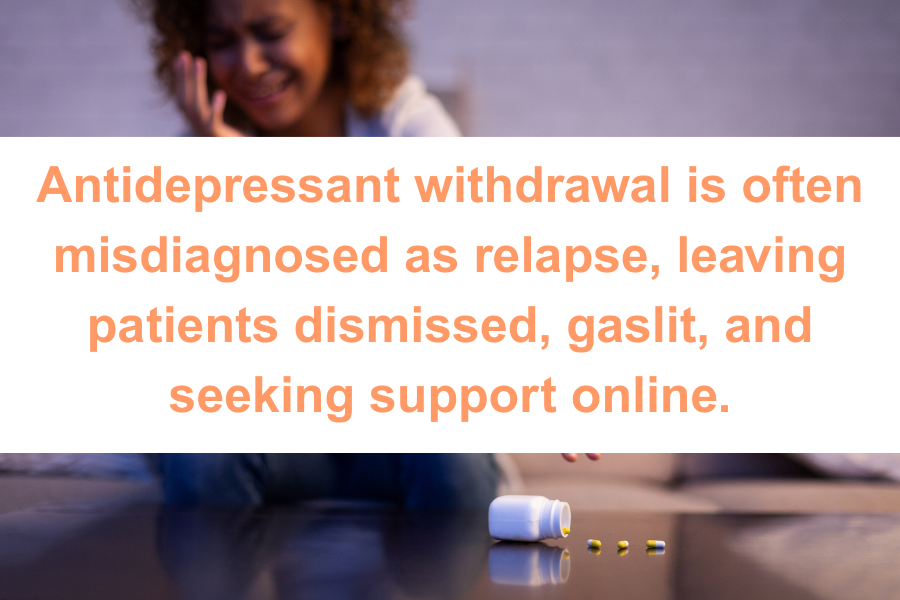For decades, antidepressants, particularly SSRIs (selective serotonin reuptake inhibitors) and SNRIs (serotonin-norepinephrine reuptake inhibitors), have been promoted as safe, effective, and non-addictive.
For many people, they have been life-saving.
But behind the prescriptions lies another story. One that is gaining louder recognition from patients, researchers, and advocacy groups alike.

Across online forums, podcasts, and professional conferences, people are speaking out about enduring and sometimes devastating “antidepressant withdrawal” effects when stopping these medications.
What was once dismissed as “mild and short-lived discontinuation” is now being recognized by patients as a serious medical and social issue (NPR, 2025).
The Reality of Long-Term Antidepressant Withdrawal
For some, antidepressant withdrawal symptoms are not just a week of dizziness or irritability. They can stretch into months or even years. People describe:
- Severe anxiety and panic attacks
- Nerve pain, vertigo, and “brain zaps”
- Profound emotional numbness, including an inability to feel love or joy
- Persistent sexual dysfunction (PSSD) long after medication is stopped
Phillipa Munari, featured in NPR’s reporting, developed relentless anxiety and nerve pain after tapering off Effexor. It took more than two years for her brain to stabilize.

Sven Huber, a patient from western Germany, says he developed genital numbness just one day after taking his first Lexapro pill. After spending 13 years on antidepressants, he now reports that sexual dysfunction and emotional numbness have persisted long after stopping the medication (NPR, 2025).
These stories aren’t rare.
A systematic review by researchers James Davies and John Read found that 56% of people who try to quit antidepressants experience withdrawal, and nearly half describe their symptoms as severe (Mad in America, 2020).
This shatters the long-held belief that antidepressant withdrawal side effects are “uncommon” or purely psychological.
Related Post – PSSD: The Silent Aftermath of Antidepressant Use
Why Doctors Often Miss the Signs
One troubling aspect of SSRI withdrawal and SNRI withdrawal is how often it is overlooked or misdiagnosed by medical professionals. Many psychiatric residents are still taught that symptoms during tapering mean relapse of depression. This assumption can lead to unnecessary re-prescribing and years of extended use.
Dr. Giovanni Fava, a leading researcher on antidepressant side effects, explains:
If residents are taught that tapering symptoms cannot be withdrawal, they will inevitably interpret them as relapse conclusion which benefits pharmaceutical companies (Mad in America, 2020).
Language has also played a role.
The term “discontinuation syndrome” was coined to soften the reality of withdrawal, separating it from the more serious withdrawal syndromes seen with benzodiazepines. This industry-driven framing minimized patient suffering for decades.
As a result, many patients feel dismissed and gaslit by their providers.

Instead, they turn to online communities for support. Subreddits and forums dedicated to PSSD and antidepressant tapering have grown exponentially from 1,000 to over 17,000 members in just five years (NPR, 2025).
The Shift in Research and Advocacy
After decades of denial, the tide is finally beginning to turn:
- Research acknowledgment:
Experts like Dr. Nassir Ghaemi at Tufts University recognize that severe serotonin withdrawal syndrome is real, though under-researched.
- Advocacy groups:
The PSSD Network has launched new research initiatives, supported by community fundraising and international collaborations.
- Guideline updates:
The UK’s National Institute for Health and Care Excellence (NICE) revised its guidelines to state that antidepressant withdrawal can be prolonged and severe.
- Professional change:
Even the American Psychiatric Association has begun examining patient reports after decades of silence.

Still, this is a clear example of iatrogenic harm, medically induced damage affecting tens of millions, that psychiatry has been slow to recognize and address.
What Patients Need to Know
If you’re currently taking an antidepressant, this does not mean you should stop. These medications can be life-saving.
But it does mean you deserve accurate information and a clear plan if you ever decide to taper off. Practical steps:
#1 Be cautious with long-term use – Reassess whether benefits still outweigh risks.
#2 Never stop cold turkey – Gradual tapering, sometimes over months or years, is essential.

#3 Track your symptoms – Keep a journal of physical and emotional changes.
#4 Find supportive providers – Seek clinicians trained in integrative or functional psychiatry who acknowledge withdrawal risks.
#5 Advocate for yourself – You deserve recognition, validation, and safe support.
The Bigger Picture
The story of antidepressant withdrawal recovery is not just about side effects… It’s also about how medicine listens to patients.
For years, lived experience was brushed aside in favor of pharmaceutical narratives. Thanks to patient advocacy, media coverage, and emerging research, the truth is finally breaking through.
Millions deserve answers, recognition, and safer pathways to healing.

Antidepressant withdrawal is not rare, nor is it imaginary; it is a reality that psychiatry must urgently address.
As patient advocate Nick Alves put it, research funding is a “historic” step forward. But for the many still suffering, it is not nearly enough.
The call is clear: psychiatry must catch up with the lived reality of those it serves.
Sources:
- Emily Corwin, NPR: “People say they’ve faced withdrawals from SSRIs. They want recognition and research”, June 27, 2025.
- Christopher Lane, PhD, Mad in America: “The Reckoning in Psychiatry Over Protracted Antidepressant Withdrawal”, October 28, 2020.
+ show Comments
- Hide Comments
add a comment